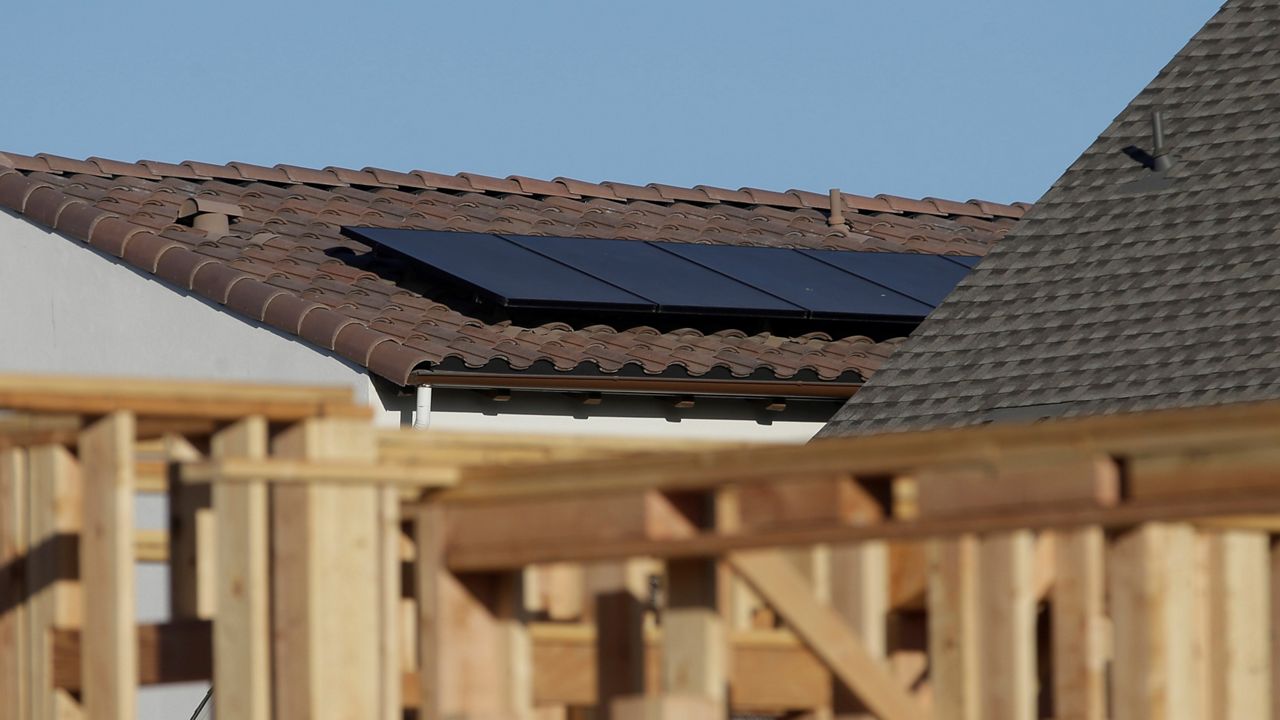Cars get a lot of the blame for greenhouse gas emissions that contribute to climate change, but another major source is buildings. In California, homes and businesses are responsible for nearly a quarter of the emissions that lead to global warming, according to the California Energy Commission.
On Wednesday, the state's energy policy authority voted unanimously to approve rules that reduce buildings' dependence on fossil fuels and increase energy efficiency. The 2022 Energy Code establishes electric-ready requirements for single-family homes so they can use electricity for cooking, heating their homes and charging vehicles. It also encourages electric heat pump technology for space and water heating instead of natural gas.
Additionally, it expands existing standards for rooftop solar and battery storage systems to make clean energy available where it is used. And it strengthens ventilation standards for gas stoves to improve indoor air quality. The rules apply to newly constructed homes and businesses and would take effect Jan. 1, 2023, pending approval by the California Building Standards Commission later this year.
"Buildings profoundly influence our health, environment and economy," CEC Commissioner J. Andrew McAllister said in a statement announcing the CEC's vote in support of the 2022 Building Energy Efficiency Standards. "Into the future, they will use less energy and emit less pollution while still being comfortable and healthy."
The 2022 Energy Code sets the stage for newly constructed homes and buildings in California to forgo natural gas appliances in favor of ones that run with electricity. It depends on the home, but most use natural gas to heat water and fuel furnaces, stoves and clothes dryers.
While the 2022 Energy Code does not ban gas-powered appliances, it nudges the state building code toward electricity as California strives to meet the goal of supplying 100% of its electricity with renewable, carbon-free sources by 2045 and as the Biden administration seeks national decarbonization by 2050.
Appliances powered with fossil fuels that generate climate-changing emissions aren't only a target of California regulators but the U.S. Environmental Protection Agency. The EPA updated its Energy Star standards for residential water heaters and heating and cooling equipment in May.
The agency estimated that if all heat pumps, central air conditioners and electric water heaters sold in the U.S. met the new Energy Star standards, it would save 255 billion pounds of greenhouse gases per year. That's roughly one-third of all direct greenhouse gas emissions from American homes and apartments in 2019.
In 30 years, the changes outlined in the 2022 Energy Code are expected to reduce greenhouse gas emissions by 10 million metric tons — the equivalent of taking almost 2.2 million cars off the road for a year, according to the CEC.
Updated every three years, the California Energy Code guides the construction of buildings to withstand extreme weather, lower energy costs and reduce climate and air pollution. Citing the accelerating impacts of climate change, the California Energy Commission said the need for comfortable, efficient, and resilient buildings is increasing.
"The latest report from the international climate scientists published Monday makes it clear that we must stop building any new gas infrastructure, including new gas-fuel buildings immediately," said Pierre Delforge, senior scientist with the Natural Resources Defense Council. "California's building code provides a model for the rest of the world for how to build homes and other buildings that can be powered with clean energy while also saving on construction and energy costs."
The NRDC is one of several environmental groups that cheered Wednesday's CEC vote, but getting Americans to get rid of their gas appliances could be a hard sell.
A poll of 2,200 U.S. adults conducted by the Morning Consult earlier this year found that 44% of Americans support banning natural gas in new construction in their communities, and 37% oppose it. Half of the respondents said they were unlikely to buy an electric stove because they found them less effective than gas.



